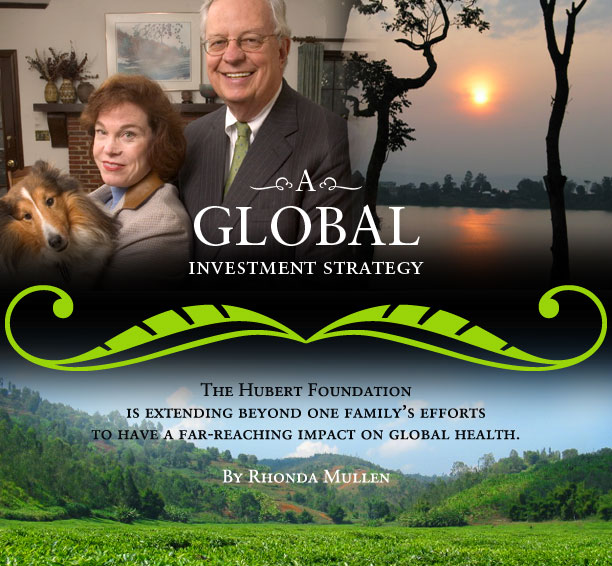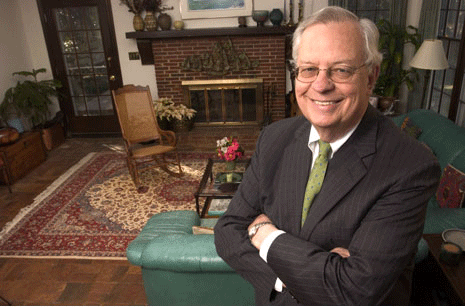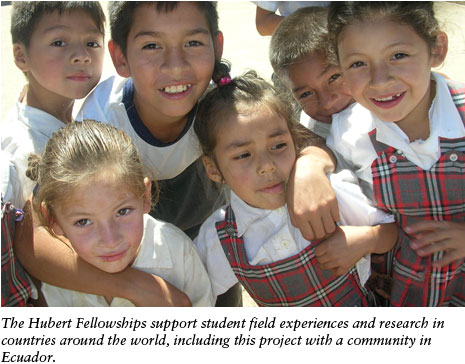












|
 |
| |
|
|
| |
From
their home in Druid Hills, the Huberts are committed to moving the
synergy coalescing around global health in Atlanta to the rest of
the world. |
|
| |
|
|
| |
 |
|
| |
|
|
| |
 he
Hubert Foundation he leads has committed a total of $10 million
to the Rollins School of Public Health (RSPH) for global health
initiatives. The support thus far has enabled students to travel
overseas to do research in the field, established two chairs, and
created a fund that promotes excellence in global health. In recognition
of these gifts, the RSPH recently named its Department of Global
Health for the Hubert family. The Hubert Department of Global Health
is the first named department of global health at any school of
public health in the country. he
Hubert Foundation he leads has committed a total of $10 million
to the Rollins School of Public Health (RSPH) for global health
initiatives. The support thus far has enabled students to travel
overseas to do research in the field, established two chairs, and
created a fund that promotes excellence in global health. In recognition
of these gifts, the RSPH recently named its Department of Global
Health for the Hubert family. The Hubert Department of Global Health
is the first named department of global health at any school of
public health in the country.
The foundation’s first foray
into global health was a donation of $50,000 to allow 25 students
to complete health practicums overseas. When those students returned
with reports on the hands-on experiences they had, the Huberts found
a cause that fit well with the mission of their family’s charitable
trust.
The trust originated with Richard
Hubert’s father, O.C. Hubert, a self-made businessman who
at his death in 1986 was the largest private individual owner of
property in Cobb County, Georgia. Untangling the estate was complicated
for Hubert’s family members, who were presented with a tax
bill for almost the estate’s entire worth. In a tax case that
went all the way to the U.S. Supreme Court, the legal issues eventually
were sorted out, with the family winning its case. The court established
a trust, appointing Richard Hubert and William Foege, then executive
director of The Carter Center, as two of its trustees.
The Hubert Foundation’s charge
from O.C. Hubert was to feed the hungry and cure the sick. “I
didn’t have a notion of how to do that,” Hubert says.
“I was bewildered. But when Bill Foege entered the picture,
he gave us meaning and purpose.”
|
|
| |
|
|
| |
 |
|
| |
Richard
Hubert |
|
| |
|
|
| |
Encouraged
by the success of the first students they had sponsored, the Huberts
created an endowment of $1 million for the O.C. Hubert Fellowships
in International Health. (See related story.)
The fellowships jelled with the family’s own experiences.
Hubert’s stepson, Christopher Woods, now an assistant professor
in Duke’s medical school, had done a field study in Kenya
as part of his medical residency.
“These programs are motivational,”
says Hubert. “They offer people who want to be of service
on the forefront of exotic diseases and pandemics a practical alternative
to private practice.”
A portion of the Hubert Foundation’s recent pledges will double
the endowment for the fellowships. “What these students bring
back has a far greater value than a plane ticket,” says Hubert.
“They have lived among the locals and seen health challenges
firsthand. They come back changed. Tell me where else you can get
that much for your money.”
Hubert’s wife, Linda, a professor
emerita of English at Agnes Scott College, is an equally passionate
advocate for public health. “The world has shrunk so that
today medicine has to embrace global health,” she says. “It’s
of the utmost importance because what happens in one place affects
another.”
|
|
| |
|
|
 |
| |
|
|
| |
In
addition to the fellowships, the Hubert Foundation has established
two chairs at the RSPH: the Ruth and O.C. Hubert Chair in Religion
and Health and the William H. Foege Chair in Global Health. Keith
Klugman, the world’s premier expert on antibiotic resistance
in pneumonia, was recently appointed as the first Foege chair, which
honors the presidential distinguished professor of global health
and the man who introduced the Huberts to the RSPH. (See
related story.)
The Huberts have been key to making
global health a powerful force at Emory, says Foege. “Their
contributions have placed Emory in a unique position for global
health.”
According to Foege, strengths of the
global health program include having a dean who has a global vision
and a faculty with experience in global health. “Now you would
think that requirement is just common sense,” Foege says.
“But first of all, there are not many places that have a strong
global health program. Second, if they have such a program, they
may not have faculty who have actually lived and worked in developing
countries.”
Foege himself completed his master’s
degree work in tropical public health 40 years ago in a department
that he describes as “great but without a single faculty member
who had lived overseas. Emory has people who actually have had to
make a payroll in a developing country. They know what it’s
like to get up in the morning and be faced with problems that seem
insurmountable. I think this is very valuable for students.”
|
|
| |
|
|
| |
 |
|
| |
|
|
| |
With
a well-established international reputation in global health, the
RSPH has set its aspirations even higher. The school has set a goal
to become one of the top five public health schools in the United
States, and the Huberts are helping place that goal within reach.
The Richard N. Hubert Fund for Global Health Excellence will set
aside $5.1 million to help the school strategically become a leader
in global health. The fund will allow the RSPH flexibility in responding
to opportunities that in the past have been limited by lack of start-up
funds.
The Huberts’ investment in global
health initiatives extend beyond Emory to the CDC Foundation, Global
Health Action, Medshare, and other initiatives. They support two
goat farms in Haiti and North Korea that provide milk, yogurt, and
food to the local people. From their home near Emory in Druid Hills,
they remain committed to moving the synergy coalescing around global
health efforts far beyond Atlanta.
“We’ve been able to work
with a relatively modest estate to marshal talents and resources
in global health and have a tremendous impact,” Hubert says.
“This is not an exclusive club. Ordinary people can get in
on this and make things happen.” |
|
| |
|
|
| |
|
|
|
|
|
|



